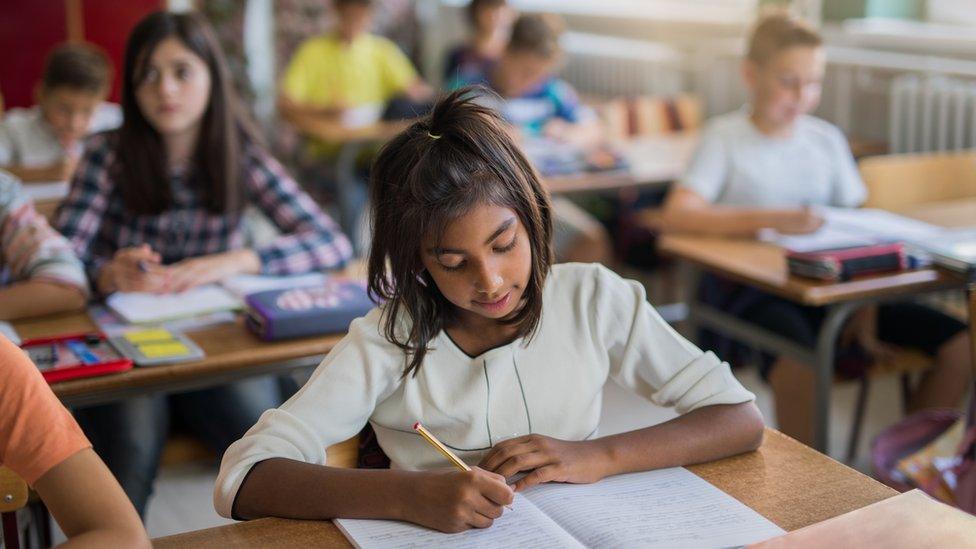Gypsy pupils experience bullying and racism, MPs told
- Published

Bullying, racism and feeling left out of the curriculum are major factors in low school attendance rates among Gypsy, Roma and traveller (GRT) children community, MPs have heard.
Poor attendance was their main barrier to academic achievement, told the Women and Equalities Committee.
They have the worst educational outcomes of any ethnic group, with just 21 in England sitting A-levels in 2016.
But the cross-party committee heard that the picture was complex.
Sean Harford, national director for education for Ofsted, said: "Exclusions are very high - exclusions, absence, a lack of previous education, certainly in the case of Roma children coming from Eastern Europe, and areas of bullying and racism.
"There's a push and a pull factor here, I think, between some schools that push the children away and don't make them welcome [and] others where the families are pulling the children away at the same time.
"It's a complicated picture but those factors will have an impact."
'Not about us'
Prof Kalwant Bhopal, from the Centre for Research in Race and Education, at Birmingham University, said traveller education services had been "drastically reduced", impacting on attendance.
"The traveller education service played a vital role in providing an advocacy role for the families, not just in relation to education but also in relation to accommodation, health and other needs - so that's one factor.
"Secondly, the curriculum in schools does not address the needs of traveller children. It's not an inclusive curriculum. It does not represent adequately Gypsy and Roma traveller histories.
"In my research, in our research at Birmingham, we have found that many parents and indeed children talk about the ways in which they don't feel that they're represented within an inclusive curriculum.
"And finally... Gypsy and traveller families and indeed children experience huge amounts of racism and discrimination in schools, not just from their peers but indeed from their teachers as well."
She added: "Quite often when traveller children complain about racism to their teachers, it's not seen as racism because they're white groups - and so I think we need clearer guidelines on how this group is treated and the discourse and the narrative around how Gypsies and travellers are treated."
Sex education suspicion
Rose McCarthy, who chairs the Advisory Council for the Education of Romany and other Travellers and is of Irish Traveller heritage, told MPs Irish Traveller families were often mistrustful of aspects of the curriculum, such as sex education.
"Traveller families are quite against that kind of thing. Those things are taboo and are only talked about at home."
Ms McCarthy also spoke about the importance of schools acknowledging GRT culture, saying it was important for GRT children "to feel worthy" to be at school.
She said a child could be made to feel different from a very early age.
"From primary level even, the child is asked to draw themselves or draw their home... and the majority of children are drawing figures of houses and gardens and the travelling child somehow or other just can't put down where they come from, what they do, especially if they live in a caravan."
Family responsibility
But Philip Davies, Conservative MP for Shipley, said the experts were not expecting enough of the families themselves.
"We've heard numerous reasons given for why Gypsy-traveller pupils drop out of school often before starting secondary education - that they are victims of bullying and racism, because they're socially excluded, because of the stereotypes, because of funding cuts for specialist services, because we don't have GRT history taught properly, because of sex education and PE being taught in schools, because of uniform policies, because of the trauma of detention.
"I mean literally the list of excuses is endless and all of those example have one thing in common - none of them are the responsibility of the Gypsy and traveller community themselves.
"So, is there any responsibility here on the families themselves, on the communities themselves, is there anything at all where they are at fault or responsible for the poor educational outcomes or the dropping out of school, or is it always someone else who's to blame?"
Ms McCarthy replied that while in the past GRT parents may not have encouraged their children to go to school, that was changing.
"Times have changed now. We have younger parents who are very much for education, very much encouraging their children to go on to further education and higher education.
"Yes of course there are parents, like other parents in the wider community, that don't encourage their children to go to school - but those that do encourage their children to go to school are very disappointed with the school, with the majority of what happens in the school.
"It's not about the school. It's about what happens in the school and what is happening in the school is bullying and discrimination and racism."